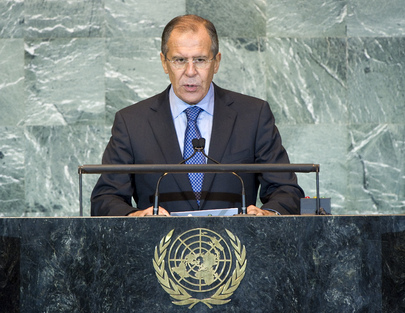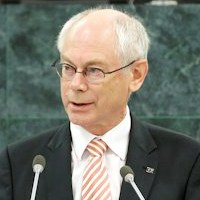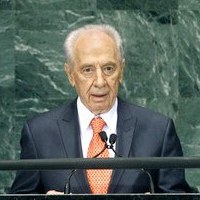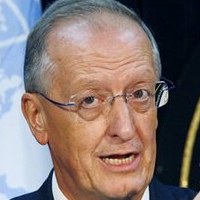![]()
Tue, Sept 27, 2011 | UN TV
FM Sergey Lavrov Addresses the General Debate of the 66th Session of the General Assembly
Address by His Excellency Mr. Sergey Lavrov, Minister for Foreign Affairs of the Russian Federation at the General debate of the 66th Session of the General Assembly of the United Nations (New York, 21-24 and 26-30 September 2011).
Russian Federation, General Debate, 66th Session
STATEMENT
by H.E. Mr. Sergey V. LAVROV,
Minister of Foreign Affairs of the Russian Federation,
at the 66th Session of the UN General Assembly
September 27, 2011
Distinguished Mr. President,
Ladies and gentlemen,This year the session of the General Assembly has opened at a time when international relations are going through a zone of turbulence. The Middle East and Northern Africa have entered a period of large-scale changes, and the situation is “feverish” in some other parts of the world. We have not yet been able to reliably put the world economy back on the track of progressive sustainable development. The accumulation of alarming factors has been accompanied by exacerbation of social, interethnic and intercultural conflicts, and outbreaks of extremism.
Just as a ship caught in adverse weather conditions that needs a united team and a compass to take the right course, the international community today especially needs a combination of efforts to respond to the common challenges, and clear guidelines to strengthen the mechanisms of global governance. We are convinced that such guidelines should include, first and foremost, the rule of international law, clear, strict and responsible use of the fundamental principles of the UN Charter, and the will to implement a positive unification agenda.
The United Nations remains a pillar of international relations and equitable multilateral cooperation in the interests of all States. The UN has a unique legitimacy and necessary authority to respond adequately to the variety of contemporary risks and threats. It is the UN that should continue to provide political, legal and moral leadership in dealing with global challenges, to establish equitable principles and standards of interaction, to monitor their implementation, and to render necessary assistance and support for the States in need.
Ten years ago on September 11, a horrible terrorist attack was committed in this city. We are convinced that it is necessary to strengthen multilateral cooperation in countering international terrorism both on the global and regional level. However, the additional mechanisms to be created in this area should be incorporated in the common work within the UN with due account for its central coordinating role in combating terrorism.
Wide international cooperation is needed to keep the situation in the global economic and financial system under control. One can hardly deny the importance of the role that the G20 plays in the post-crisis recovery of the world economy. Today, it is important to finalize the process of reforming the global financial and economic architecture, and to implement all that we have agreed on rather than to stop half-way. The efficiency of these efforts will only grow if the G20 strengthens its dialogue with the UN and its specialized agencies. A significant contribution to the reform of the global economy and finance is being made by BRICS — a global-scale association of five major rapidly growing economies that reflects the realities of the evolving multipolar world. BRICS does not aim at confrontation with anyone, — its goal is to enhance productive multilateral collaboration to address the urgent problems of the contemporary world.
The sustainable development requires reliable supply of energy resources for the global economy. Russia has made a proposal to elaborate a Convention on International Energy Security that would cover all aspects of global energy cooperation taking into account the balance of interests of all actors in the international market. We call for starting practical preparation of this document.
Like in economics, the logic of joint consolidated actions should prevail on matters of security and elimination of surplus weapons worldwide. Russia and the US made another important step towards nuclear disarmament when they signed the START Treaty and began its implementation. Its practical realization will allow us to make sure that the Treaty is effective and viable and to see how its fundamental principles are implemented. We call on all States with nuclear weapons capability to join the US-Russian efforts. We believe that further progress in nuclear arms reductions is possible only on a multilateral basis.
Moreover, the progress in this area is inseparable from coordinated efforts to move forward on all aspects of strengthening international security and strategic stability. This includes the development of universally acceptable approaches to the missile defense issues, accounting of the impact of strategic conventional arms, prevention of weaponization of space, and elimination of qualitative and quantitative imbalances of conventional arms.
Deployment of strategic missile defense elements in various parts of the world alters the overall configuration of international security. It is not enough to make statements that the increase in global missile defense capabilities would not undermine the basics of strategic stability. The issue is way too serious. We need solid legal guarantees that missile defense potential will actually be adequate to the declared objectives and will not disrupt global and regional balances. This equally holds true both for Europe, and for the Asia-Pacific region, where ballistic missile defense is becoming a factor that affects the strategic environment.
It is of primary importance for us to prevent the undermining of the non-proliferation regime. We call for universalization of the Treaty on Non-Proliferation of Nuclear Weapons, strengthening of the IAEA safeguards system, and entry into force of the Comprehensive Nuclear-Test-Ban Treaty. Russia has been one of the main initiators of the proposal to convene in 2012 a conference on establishing a zone free of weapons of mass destruction and means of its delivery in the Middle East, and is now intensively working together with its partners on the preparation of this important forum.
The early resolution to the nuclear problems of Iran and the Korean Peninsula would contribute to the strengthening of the non-proliferation regime. We see no alternative to their political and diplomatic settlement and take concrete steps to create conditions for the resumption of negotiations. We call on all the partners to address these tasks with utmost responsibility.
The situation around Japan’s Fukushima-1 Nuclear Power Plant has highlighted the need to improve the international legal framework in order to ensure safety of nuclear power facilities. The Russian Federation has made proposals to enhance the mechanisms of Conventions on Nuclear Safety and the Early Notification of a Nuclear Accident, as well as to strengthen the relevant IAEA norms. We urge support for these initiatives.
In the age of new telecommunication technologies, the international information security has become a challenge that requires coordinated efforts of the international community. A reliable protection of information field from malicious and criminal attacks is the goal of the initiative that Russia and its partners are promoting in the UN. During this session we will put forward the proposals on elaborating specific rules of conduct in this area.
Mr. President,
In a polycentric world, an effective international architecture can be created only if it rests upon regional “building blocks”. The enhancement of the regional level of global governance and the increasing role of regional organizations are an integral part of the modern international relations. Integration associations and organizations in the CIS space make their contribution to these processes. The Eurasian Economic Community with its $10 billion Anti-Crisis Fund operates in the financial and economic sphere. The Customs Union between Russia, Kazakhstan and Belarus has been created; the single economic space is taking shape with the view to establishing a Eurasian union.
The Collective Security Treaty Organization is a key tool to ensure stability within the area of its responsibility. The signing of the Joint Declaration on Cooperation between the UN Secretariat and the CSTO Secretariat in March 2011 became a major step in the collaboration between these two Organizations, primarily in the field of peacekeeping. We are ready to start working on its practical modalities. Russia consistently calls for interaction between regional organizations under the auspices of the United Nations to strengthen global stability on the basis of the solid legal framework of the UN Charter.
Priority should be given to equal and indivisible security, predictability, transparency, and mutual respect, taking into account each other’s interests. This is exactly the aim of President D. Medvedev’s initiative to sign a treaty on European security — its practical implementation would allow to finally draw the line under the post-Cold War period, to establish a universal and clear framework for a reliable solution to such issues, as the NMD and arms control, and to create a common space of security and development without dividing lines.
Achieving equal and indivisible security is an urgent issue for the Asia-Pacific region with Russian Far East and Eastern Siberia as its integral parts. The joint initiative launched by the leaders of China and Russia in September 2010 is aimed at creating a comprehensive architecture of security and cooperation in the Asia-Pacific region on a bloc-free legal basis. We could move closer to achieving this goal by promoting a network multilateral diplomacy, — an idea which has been supported by the members of the Shanghai Cooperation Organization.
Progress in the settlement of regional conflicts would contribute to a more stable international environment.
Today, special attention is attached to the developments in the Arab world. Russia condemns the use of violence against civilians, and supports the aspirations of Arab peoples for revival of their States and their democratic development and social and economic prosperity. At the same time, the actions by the outside forces must be based on full respect for international law and be instrumental to the search for a political settlement between the authorities and the opposition. The attempts to go beyond the UN SC mandate are unacceptable, since they undermine its authority, and multiply the suffering of innocent civilians.
In this context, it seems quite pertinent that the States and regional organizations commit themselves to strictly complying with the existing norms of international law, including humanitarian law, in order to protect civilians during the armed conflicts. This step that further enhances the existing legal basis of international relations would contribute to the strengthening of regional and global security in its modern multidimensional interpretation.
The leading role in elaborating modalities for the post-conflict resolution in Libya must belong to the United Nations and its Security Council. This is precisely the goal of SC Resolution 2009 (2011) of September 16, that has established the UN Support Mission in Libya. We believe that it is time to make additional steps including the lifting of the no-fly zone.
As for Syria, it is inadmissible to boycott proposals on a national dialogue, stir up confrontation and provoke violence, while neglecting albeit late but still achievable reforms proposed by President Bashar al-Assad. It is important to encourage the authorities and the opposition to start negotiations and agree on the future of their country. We hope that the League of Arab States will make relevant efforts.
The situation in the Middle East could be significantly improved by the progress in the negotiation process on the Middle East settlement, with its main parameters as defined and recorded in the UN Security Council resolutions, the Madrid principles and the Arab Peace Initiative, and reiterated in the Quartet Ministerial Statement of September 23. The only viable basis for settlement is the coexistence of Palestinian and Israeli States in peace and security. We support the application of the Palestinians to the UN Security Council and welcome the readiness reiterated by PNA President M. Abbas to hold talks with Israel on the basis of the existing international legal framework.
We encourage the Cypriot communities to continue negotiations under the UN auspices to achieve a comprehensive, just and viable settlement on the basis of the Security Council resolutions.
We call upon all the parties to the Nagorno-Karabakh settlement process to use additional opportunities arising from the efforts taken under Russia’s mediation. We will promote confidence-building and cease-fire enforcement measures within the framework of the “Troika” of the Co-Chairs of the OSCE Minsk Group, together with American and French partners.
We hope that the decision taken in Moscow on September 22 on resuming the official talks on the Transnistrian settlement will encourage the parties to search for ways towards mutually acceptable agreements.
We are strongly committed to doing our utmost in order to prevent a repetition of the use of force scenario in the Caucasus as it happened in August 2008 as a result of a reckless venture by the ruling regime in Tbilisi. Russia is ready to act as a guarantor of arrangements on non-use of force between Abkhazia, Georgia and South Ossetia taking into account the earlier relevant statements made by the leaders of these three parties. We would welcome it if the United States and the European Union made similar commitments. As guarantors, we would be ready to take steps to prevent resumption of violence in the region and in case of wrongful use of force by either side, to work towards the early settlement of the situation on the basis of the existing norms of international law.
Russia provides significant support for the efforts to stabilize the situation in Afghanistan. At the same time, we call on the ISAF to fight more effectively against the growing Afghan drug threat. We can say that the Central Asia and Russia are already facing a “heroin aggression” while the profits from the drug-trafficking are being used as the main source for financing the clandestine extremist underground in the region. The fight against this evil should be uncompromising, and it should target the entire drug business chain.
The problems on the African continent should be a focus of continuous attention of the UN, that includes development assistance, overcoming the current humanitarian crisis in the Horn of Africa, and settlement of numerous conflicts while maintaining the leading role of the African Union.
Eradication of piracy remains a priority. It is necessary to accelerate the establishment of an international anti-piracy court mechanism in the region in accordance with the UNSC resolution adopted on Russia’s initiative.
Experience has shown that pressure and unilateral sanctions cannot be a cure-all in addressing various conflict situations — they only complicate the search for their resolution. We urge that the actions in circumvention of the UN SC should be stopped. We call for lifting the blockade of Cuba. Cooperation rather than isolation should be the method for settling conflicts in the 21st century.
The transformation of contemporary international relations brings up a priority task on the global agenda to expand inter-cultural, inter-religious and inter-civilization dialogue in order to elaborate common value-based approaches to the problems of the modern world. Depreciation of fundamental moral values is the way to degradation of society. The recent tragic events in Norway, riots in Great Britain, youth protest manifestations in other countries, and calls to suppress Christian minorities in the Middle East and North Africa, — all these events are the result of deterioration of moral and ethical values. There can be no freedom without responsibility and no democracy without self-restraint.
There is an obvious and urgent need to counter the threats posed by nationalism, ethnic and religious intolerance. Therefore, we reiterate the importance of the recent High-level meeting of the UN General Assembly dedicated to the 10th anniversary of the Durban Declaration and the Programme of Action against Racism, Racial Discrimination, Xenophobia and Related Intolerance.
Attempts to falsify and to turn the history inside out are inadmissible, all the more when we mark the 65th anniversary of the Nuremberg Tribunal verdict. Political correctness and slogans of freedom of speech cannot serve as a cover when in certain European countries some people who stained themselves by cooperation with the Nazi are talked and written about in a more and more elevated tone. Russia will never forget the countless military crimes committed by Hitler and his associates in our land and throughout Europe during the years of the Nazi aggression.
The rapid changes taking place in the world dictate the need to strengthen the UN role and to adapt it to the contemporary realities while preserving, naturally, its interstate nature and immutability of its Charter principles. A fundamental element of the Organization’s renewal is the reform of its Security Council. We support a solution that will be based upon the broadest possible agreement.
The world community faces many challenges, and the UN, as a major mechanism of global regulation today is in demand as never before. Together we will find the practical ways to effectively overcome the threats of the 21st century.



 RSS
RSS











FM Sergey Lavrov Addresses the General Debate of the 66th Session of the General Assembly | Middle E http://t.co/IZDLMysQ
FM Sergey Lavrov Addresses the General Debate of the 66th Session of the General Assembly | Middle E http://t.co/IZDLMysQ